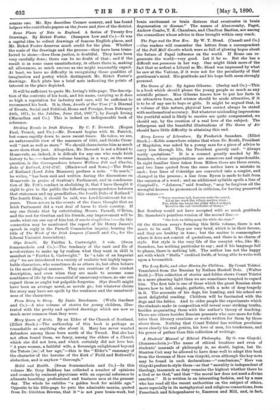Striking Events in Irish History. By C. F. Dowsett. (Kegan
Paul, Trench, and Do.)—Mr. Dowsett begins with St. Patrick, but comes rapidly down to more recent times. He takes, we see, an unfavourable view of the massacre of 1641, and thinks Crom- well " just as well as stern." We should characterise him as much more stern than just. Altogether, Mr. Dowsett is not a friend to Home-rule, as, indeed, it is difficult for any one who reads Irish history to be.—Another volume bearing, in a way, on the same question, is the Correspondence between William Pitt and Charles, Duke of Rutland, 1781-1787. (Blackwood and Sons.)—The Duke of Rutland (Lord John Manners) prefixes a note. " So much," he writes, "has been said and written during the discussions on Home-rule in praise of Grattan's Parliament, and in condemna- tion of Mr. Pitt's conduct in abolishing it, that I have thought it right to give to the public the following correspondence between that statesman and my grandfather, the fourth Duke of Rutland." The fourth Duke, it should be said, was Lord-Lieutenant for six years. These actors in the events of the times thought that an Irish Parliament did a vast deal of harm to their country. If any one thinks that by substituting Messrs. Parnell, O'Brien, and the rest for Grattan and his friends, any improvement will be made, what can one say of him but, 0 sancta simplicitas f —In this connection may be mentioned the report of Sir Henry James's speech in reply in the Parnell Commission inquiry, bearing the title of The Work of the Irish Leagues (Cassell and Co., for the Liberal Unionist Association).






































 Previous page
Previous page